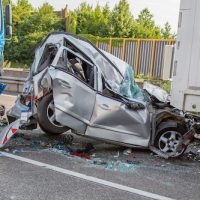Car Accidents vs Truck Accidents

California’s Office of Traffic Safety reported 65,377 fatal and injury motor vehicle crashes in Los Angeles County in 2020, which ranks the county number two in the state. Meanwhile, the Federal Motor Carrier Safety Administration reports 236 fatalities in large truck crashes in California that same year, ranking the state number two for the most truck accidents in the country. According to the Federal Highway Administration, there are currently 17,977,605 automobiles and 12,980,981 trucks registered in California. Car accidents happen far more frequently than truck crashes do, but truck accidents can be more dramatic, causing more severe or fatal injuries and often involving multiple vehicles in one incident. Below we discuss some of the differences between car and truck accidents, including important legal distinctions when it comes to recovering compensation for injuries from a negligent driver. If you or a loved one has been hurt in a car or truck accident in Los Angeles or the San Gabriel Valley, call the experienced and dedicated personal injury attorneys at Blasser Law in Claremont for help.
Truck Accidents Are Potentially Worse Than Car Accidents
Both car and truck accidents have the potential to cause severe and catastrophic injury and even death, and both types of crashes do so on a regular basis. Motor vehicle crashes are the leading cause of unintentional injury death for children and the second leading cause among all age groups. Motor vehicle crashes are the first or second leading cause of worker death in every major industry group. This data includes both car and truck accidents. However, many features of semi-trucks naturally lead to crashes with a big rig being more injurious. Some of these aspects are:
Force – According to the laws of physics, the two factors that dictate the force of an impact are the mass and acceleration of the objects that collide. 18-wheelers are considerably more massive than even the largest and heaviest SUV. A fully loaded tractor-trailer can weigh 70,000 to 80,000 pounds, compared to 3,000 to 4,000 pounds for the average passenger vehicle. Any collision involving a semi will therefore be about 20 times more forceful than the same crash involving only passenger cars.
Size and Shape – The size and shape of a semi-truck also increase the likelihood of a severe accident compared to wrecks involving comparably sized sedans. Cars that hit the rear or side of a tractor-trailer can go under the trailer, shearing off the roof of the car and crushing the occupants. Semi-trucks are supposed to be equipped with rear guards to prevent these disastrous underride accidents; side guards are recommended as well but are not currently mandated by law. Many trucks don’t use these safety measures, or they are not strong enough to prevent an underride accident with modern vehicles.
Cars can also be crushed in override accidents, where the truck drives over the car from the rear. In contrast, a rear-end collision between two cars is typically the most minor type of vehicle accident, although whiplash, back and neck injury, and other severe injuries can still occur in even relatively low-speed rear-end crashes.
Drivers of 18-wheelers must contend with multiple blind spots extending across several lanes of traffic. The size and shape of trucks require them to make extra wide turns, and they require more stopping distance due to their weight. Improper braking or unbalanced loads can result in truck rollovers or jackknife accidents that threaten to take out multiple cars in one crash.
Truck Accidents Are More Complex Than Car Accidents
Truck accidents happen for a number of different reasons: driver error, inadequate maintenance, and negligent cargo loading, to name a few. Many different parties, and sometimes multiple parties, can be responsible for causing a truck accident. These parties include:
- Driver
- Trucking company
- Maintenance or repair facility
- Freight shipping company
- Cargo loader
- Truck parts manufacturers
Car accidents are usually handled between the drivers or their insurance companies. Truck accidents nearly always involve the insurer of the trucking company or other party that hired the driver. Trucking companies carry large insurance policies from companies that invest heavily in minimizing liability and payouts. These companies typically respond swiftly to a truck accident, sometimes even appearing on the scene of the accident with a check in hand and papers to sign. This is not done for your benefit if you are the victim of a truck accident, but rather to settle your claim before you have had a chance to speak with an attorney and find out what your damages truly are. However, it takes time to investigate a truck accident and understand the resulting injuries. An experienced truck accident lawyer will look at the driver’s hours of service logs and the truck’s electronic logging devices, as well as maintenance and inspection records, records of cargo loaders, the trucking company’s safety record, its employment screening and hiring procedures, and much more.
Get Help From a Skilled and Experienced California Car and Truck Accident Lawyer
The bottom line is that car accidents and truck accidents are handled very differently, and it’s important to hire an attorney who understands how to investigate, settle or litigate your particular type of accident. If you’ve been hurt in a car or truck crash in the San Gabriel Valley or Los Angeles County, contact the skilled and dedicated Claremont personal injury lawyers at Blasser Law by calling 877-927-2181 for a free consultation to discuss your claims.



